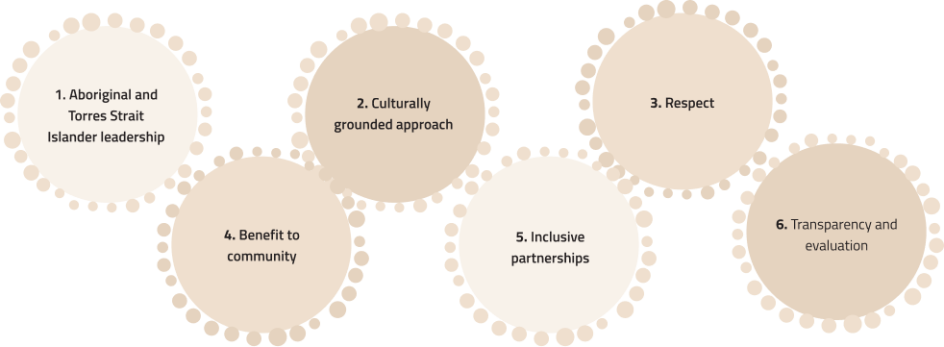The co-design principles are overarching concepts to guide the process of working together equitably and effectively.
When designing a new policy, program or service, it is critical to apply the co-design principles to ensure that the initiative meet the needs and priorities of Aboriginal and Torres Strait Islander communities.

Aboriginal and Torres Strait Islander leadership
- Take a strengths-based approach that values Aboriginal and Torres Strait Islander ways of knowing, being and doing.
- Aboriginal and Torres Strait Islander leadership must begin at project conception and continue beyond project completion.
- The nature and function of Aboriginal and Torres Strait Islander leadership must be determined in partnership with community and include people with a range of backgrounds and circumstances relevant to the topic area.
Culturally grounded approach
- The co-design project and approach centres Aboriginal and Torres Strait Islander worldviews and ways of working, inclusive of cultural diversity.
- Reflects the strengths of Aboriginal and Torres Strait Islander culture and acknowledges and accounts for the continuing impacts of colonisation and racism.
- Non-Indigenous people involved in the process must continually strive for cultural competency, self-reflection, and recognition of privilege and power differentials.
Respect
- The approach is based on mutual respect. The expertise, experience and time of Aboriginal and Torres Strait Islander people and organisations must be valued and compensated to ensure equity for all involved in the co-design process.
- Approaches must respect the preferences, timelines and competing priorities of Aboriginal and Torres Strait Islander partners. Be flexible and iterative, allow adequate time and resources, establish regular communication, set reasonable (not tokenistic) expectations.
Benefit to community
- The process and outcome of co-design ensures meaningful and sustainable benefit to Aboriginal and Torres Strait Islander peoples and communities, as defined by the community themselves.
- Be transparent about the benefits of the project for all involved.
Inclusive partnerships
- Trust and shared understanding must be established before co-design can begin.
- Fostering and maintaining equitable and collaborative relationships between all participants is central in driving effective co-design projects.
- Appropriate two-way communication channels and conflict resolution processes are established by and with community and maintained throughout the process beyond the completion of the project.
Transparency and evaluation
- It is essential to be transparent in all aspects of the co-design project, including the methods, outcomes and collection of data.
- Accountability to Aboriginal and Torres Strait Islander leaders must be formalised and embedded into co-design projects.
- Monitoring and evaluation must be embedded throughout the co-design process using agreed performance indicators that facilitate transparency and accountability to community.
Last updated 6 December 2024

